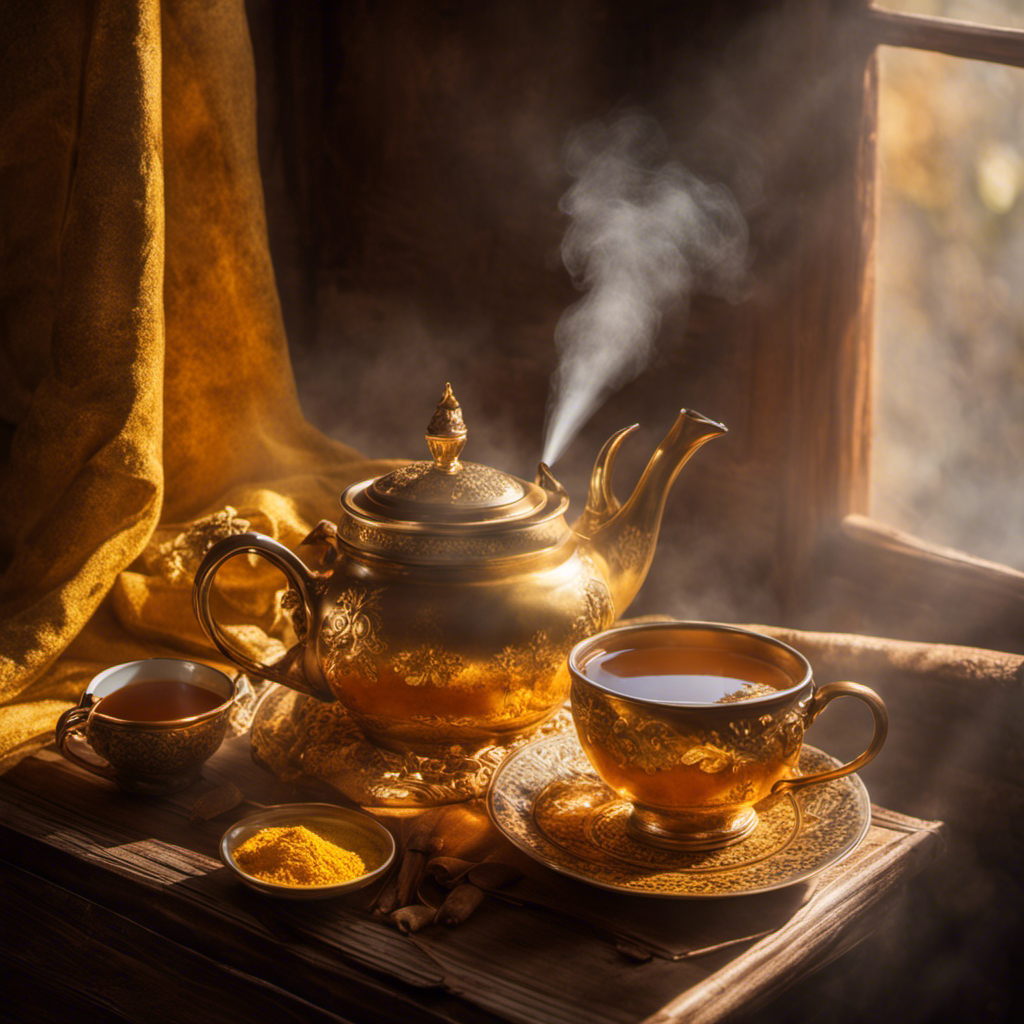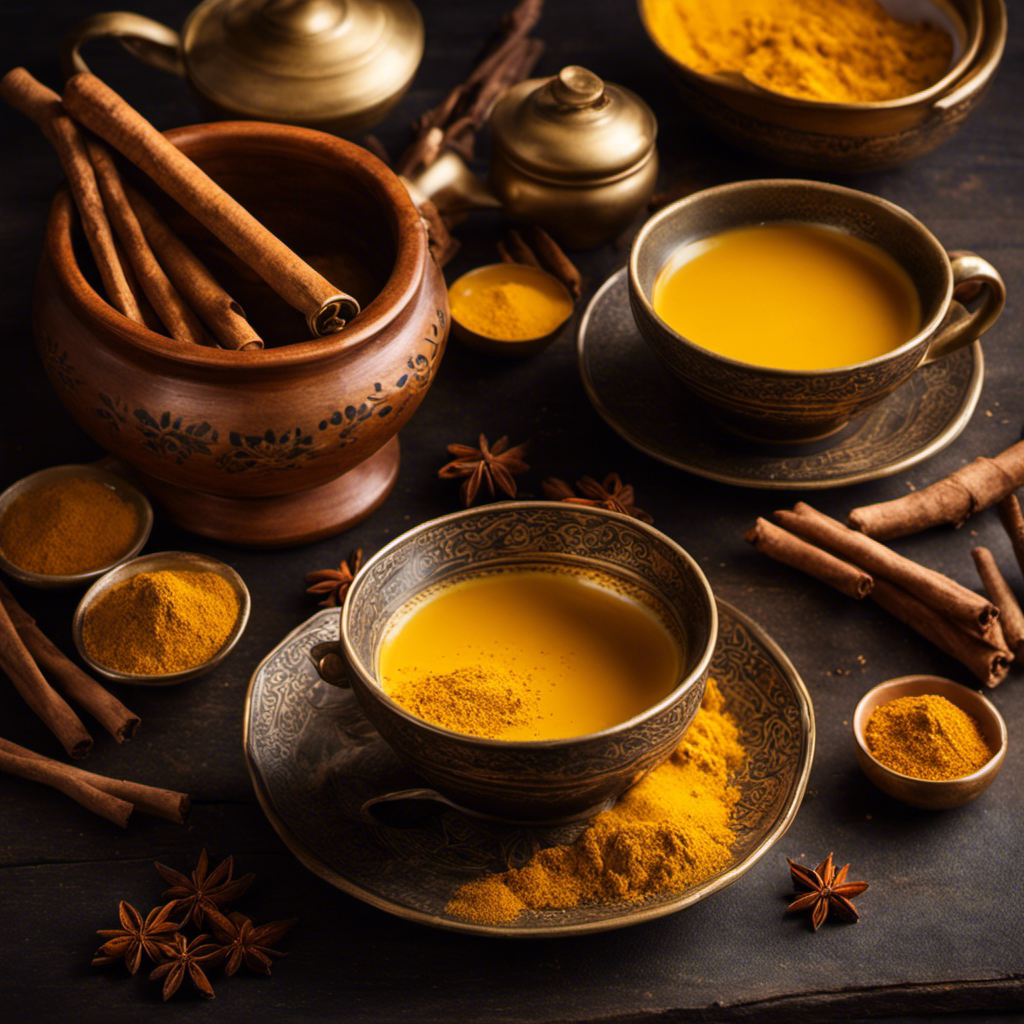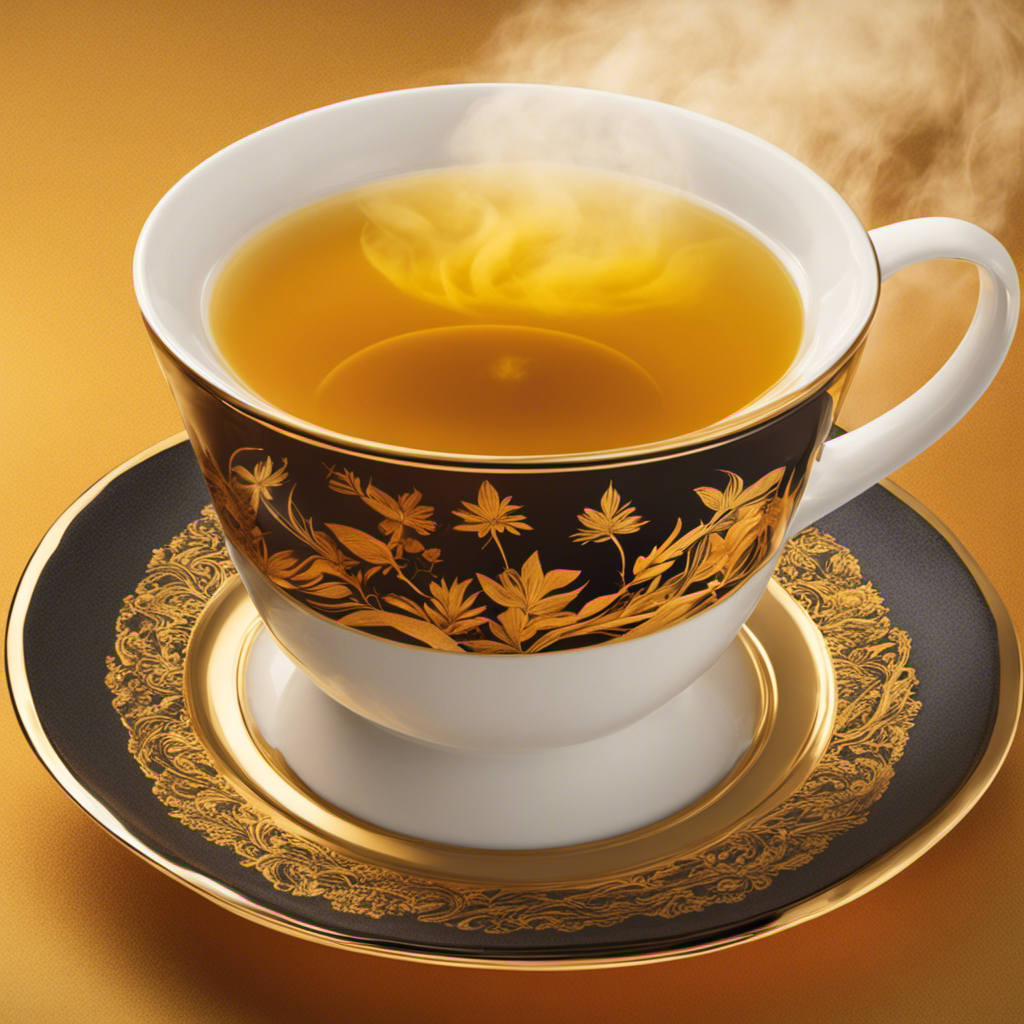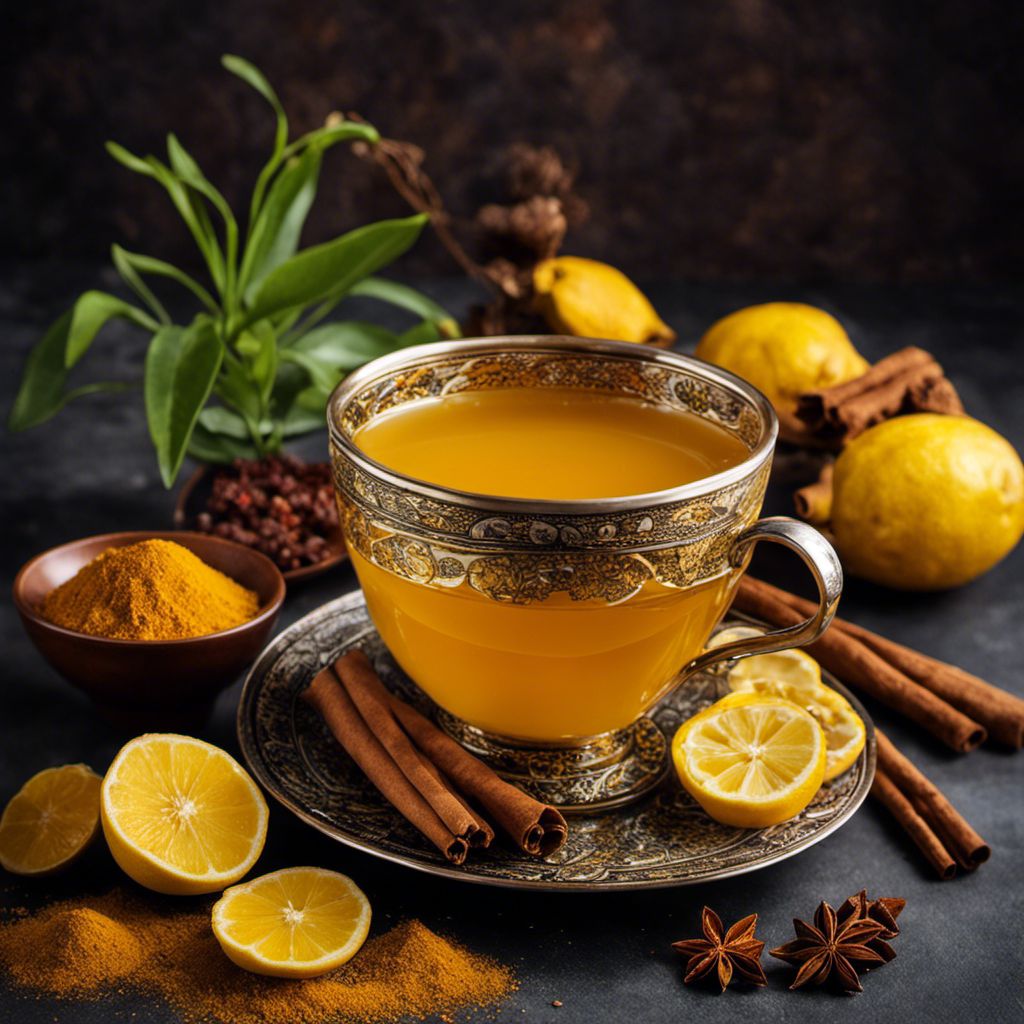Coffee Alternatives And Tea
The Ultimate Guide To English Breakfast Tea: Flavor, Brewing Tips, And More!

Welcome to the ultimate guide to English Breakfast tea: Flavor, Brewing Tips, and More!
Picture this: it’s a crisp morning, the sun is just starting to rise, and you’re craving a warm and invigorating drink to jumpstart your day. Look no further than English Breakfast tea, a timeless blend that has been enjoyed for centuries.
This beloved black tea is a harmonious combination of Chinese and Indian teas, carefully crafted to create a robust and full-bodied flavor that remains consistent year after year. The best part? It’s a versatile tea that can be enjoyed with or without milk and sugar, making it the perfect companion to a hearty breakfast.
But what sets English Breakfast tea apart? It’s all in the leaves. This blend is made from smaller broken leaves, fannings, and dust, ensuring a bold infusion with every sip. And with 30-60 mg of caffeine per cup, it’s an ideal morning pick-me-up.
In this comprehensive guide, we’ll delve into the rich and indulgent flavor of English Breakfast tea, provide brewing instructions for the perfect cup, and even explore how to create refreshing iced tea lattes. However, it’s important to note that while English Breakfast tea can enhance your mornings, it should never replace professional medical treatment.
So join me as we embark on a journey to fully appreciate and savor the wonders of English Breakfast tea. Let’s get brewing!
Key Takeaways
- English Breakfast tea is a popular black tea blend that has been around for over 200 years.
- The best leaves for making English Breakfast tea are smaller broken leaves, fannings, and dust.
- English Breakfast tea typically contains 30-60 mg of caffeine per cup.
- The best English Breakfast tea should have a well-balanced, full-bodied flavor.
What is it?
English Breakfast tea is a popular black tea blend that I enjoy because of its well-balanced, full-bodied flavor. This blend has a fascinating history and origins.
It has been around for over 200 years, originally a combination of Chinese and Indian teas. Over time, other types of tea have been included in the blend as well.
English Breakfast tea is known for its invigorating qualities and is often consumed in the morning with breakfast. It typically contains 30-60 mg of caffeine per cup, providing a gentle pick-me-up. While it may not be the strongest tea available, it pairs perfectly with a hearty meal.
Additionally, there are decaffeinated versions of this blend for those who prefer to reduce their caffeine intake. When enjoyed in moderation, English Breakfast tea can be a delightful addition to a healthy lifestyle.
Flavor and Ingredients
When it comes to the taste and ingredients of this classic blend, I must say it’s like a harmonious dance of rich flavors from Chinese and Indian teas, creating a delightful symphony for the taste buds.
English Breakfast tea is a blend of different types of black teas, typically including Chinese and Indian teas. However, it can also incorporate other varieties to add depth and complexity to the flavor profile. Each blend may have slight variations in taste, but they all share the characteristic full-bodied and well-balanced flavor that English Breakfast tea is known for.
In addition to its delightful taste, English Breakfast tea also offers several health benefits. It is rich in antioxidants, which help protect the body against damage from free radicals. The caffeine content in English Breakfast tea can provide a gentle energy boost, making it a great choice to start your day. Furthermore, studies have shown that black tea consumption may contribute to heart health and improved digestion. However, it’s important to note that English Breakfast tea shouldn’t be used as a replacement for medical treatment, and it’s always advisable to consult with a professional doctor before making any health-related decisions.
Different types of English Breakfast tea blends:
- Traditional blend of Chinese and Indian teas
- Blends with additional black tea varieties
- Black decaffeinated blends
- Scottish and Irish breakfast blends
- Flavored English Breakfast blends
Health benefits of English Breakfast tea:
- Rich in antioxidants
- Provides a gentle energy boost
- May contribute to heart health
- May improve digestion
- Contains beneficial polyphenols
Brewing Instructions
To brew a delicious cup of this classic black tea blend, I typically use 2-4 grams of tea per cup of water. I bring the water to a boil before cooling it to 203 °F for steeping. The water temperature is crucial in order to extract the full flavors from the tea leaves without scorching them.
Once the water has reached the desired temperature, I steep the tea for 3-5 minutes to achieve a strong, flavorful cup. Steeping time is also important as it allows the tea to release its aromas and infuse the water. Longer steeping can result in a more robust and intense flavor, while shorter steeping will produce a milder taste.
By following these brewing instructions, you can enjoy a perfectly balanced cup of English Breakfast tea every time.
Frequently Asked Questions
Is English Breakfast tea suitable for people with caffeine sensitivity?
English Breakfast tea contains 30-60 mg of caffeine per cup, which may not be suitable for those with caffeine sensitivity. However, there are alternatives available, such as decaffeinated blends or other tea brands specifically designed for caffeine sensitivity.
Can English Breakfast tea be enjoyed without adding milk or sugar?
Yes, English Breakfast tea can be enjoyed without adding milk or sugar. However, if you prefer to enhance the flavor, you can try adding a slice of lemon or a dash of honey. The history and origins of English Breakfast tea date back over 200 years and it is a blend of Chinese and Indian teas.
Are there any health benefits associated with drinking English Breakfast tea?
Drinking English Breakfast tea can provide health benefits, such as improved heart health and antioxidant properties. Compared to other teas, it offers a robust flavor and moderate caffeine content. However, consult a doctor before making any health decisions.
Can English Breakfast tea be steeped multiple times to get more cups of tea?
Reusing tea leaves is a great way to get more cups of tea from your English Breakfast blend. The benefits of re steeping include saving money and reducing waste. Additionally, used tea leaves can be used as a natural fertilizer for plants or to deodorize your home.
Are there any specific storage instructions for keeping English Breakfast tea fresh and flavorful?
To keep English Breakfast tea fresh and flavorful, store it in an airtight container away from light, heat, and moisture. The best brewing methods include using 2-4 grams of tea per cup of water and steeping for 3-5 minutes.
Conclusion
In conclusion, English Breakfast tea is a timeless classic that never fails to deliver a satisfying and flavorful experience. It offers a bold and robust taste that pairs perfectly with a hearty breakfast. Whether enjoyed hot or cold, this tea is a versatile option that can be customized with milk and sugar to suit your preferences. So why not start your day off right with a cup of English Breakfast tea? Its rich history and invigorating qualities are sure to make each sip a delightful journey. Cheers to the perfect cup!
Noah, the Editor-in-Chief at Cappuccino Oracle, plays a pivotal role in shaping the voice and vision of our renowned platform. With an unwavering passion for coffee, coffee alternatives, and tea, Noah leads Cappuccino Oracle towards new horizons in the realm of coffee journalism.
Beyond his professional responsibilities, Noah serves as a mentor and guiding force for his team. His dedication to journalistic excellence and genuine love for coffee, coffee alternatives, and tea continue to inspire and motivate the Cappuccino Oracle family. In the ever-evolving world of these beverages, Noah’s leadership ensures that our platform remains at the forefront, delivering enlightening and enjoyable content to our readers worldwide.
Turmeric Tea
Drinking Turmeric and Ginger Tea

Are you interested in improving your health and adding some flavor to your everyday routine? If so, consider trying turmeric and ginger tea!
This powerful combination of ingredients has been praised for its numerous health benefits. From reducing inflammation to improving digestion, turmeric and ginger are a dynamic duo.
In this article, we’ll explore the amazing potential of this tea, how to make it at home, and some tips for enhancing its flavor.
Get ready to experience a healthier and more vibrant you with each sip!
Key Takeaways
- Turmeric and ginger tea has health benefits such as reducing inflammation and improving digestion.
- The tea can be made at home by boiling water and adding grated ginger and turmeric powder.
- The best time to drink the tea is in the morning for a natural energy boost and improved digestion, or in the evening for relaxation and better sleep.
- To enhance the flavor of the tea, you can add lemon, honey, cinnamon, or fresh mint leaves.
Health Benefits of Turmeric and Ginger Tea
You’ll be amazed at the health benefits of drinking turmeric and ginger tea. Both turmeric and ginger are known for their powerful medicinal properties and have been used for centuries in traditional medicine.
When combined in a tea, they can provide numerous benefits for your digestion and weight loss goals. Turmeric contains a compound called curcumin, which has anti-inflammatory properties and can help improve digestion by reducing bloating and gas. Ginger, on the other hand, aids in digestion by stimulating the production of digestive enzymes.
Additionally, both turmeric and ginger have been found to boost metabolism and promote weight loss. So, by incorporating turmeric and ginger tea into your daily routine, you can support a healthy digestive system and potentially aid in weight management.
Now, let’s dive into how to make turmeric and ginger tea at home.
How to Make Turmeric and Ginger Tea at Home
To make a homemade version of this soothing beverage, all you need are a few simple ingredients and a quick and easy recipe. Turmeric and ginger tea offers numerous health benefits for your skin and can be a great addition to your weight loss journey.
Turmeric contains a compound called curcumin, which has anti-inflammatory and antioxidant properties. It can help improve skin health by reducing acne, promoting a youthful appearance, and healing wounds. Ginger, on the other hand, aids in digestion and boosts metabolism, making it an excellent ingredient for weight loss.
To make turmeric and ginger tea, simply boil water and add grated ginger and turmeric powder. Let it steep for a few minutes, strain, and enjoy. Remember to consult with a healthcare professional before consuming this tea regularly, especially if you have any existing health conditions or are taking medications.
Now that you know how to make this nutritious tea, let’s explore when is the best time to drink it.
Best Time to Drink Turmeric and Ginger Tea
The best time to enjoy a cup of this healthy beverage is in the morning or evening. Here are four reasons why drinking turmeric and ginger tea during these times can benefit your health:
-
Morning benefits: Starting your day with a warm cup of turmeric and ginger tea can provide a natural energy boost and promote digestion. It can also help reduce inflammation in the body, which may alleviate joint pain and stiffness.
-
Evening benefits: Sipping on turmeric and ginger tea in the evening can aid in relaxation and promote better sleep. These ingredients contain compounds that have calming properties and may help reduce anxiety and stress.
-
Anti-inflammatory properties: Turmeric contains a powerful compound called curcumin, which has been shown to have anti-inflammatory effects. Ginger also has anti-inflammatory properties, making this tea a great choice for reducing inflammation in the body.
-
Digestive support: Both turmeric and ginger have been traditionally used to aid digestion. Drinking turmeric and ginger tea can help stimulate the production of digestive enzymes, improve digestion, and relieve digestive discomfort.
Remember to consult with a healthcare professional before incorporating turmeric and ginger tea into your routine, especially if you have any underlying health conditions or are taking medications.
Tips for Enhancing the Flavor of Turmeric and Ginger Tea
Adding a squeeze of lemon or a dash of honey can enhance the flavor of turmeric and ginger tea. These ingredients not only add a pleasant taste, but they also offer their own health benefits.
Lemon is a rich source of vitamin C, which can boost your immune system and aid in digestion. Honey, on the other hand, provides natural sweetness and has antibacterial properties.
If you’re looking to explore different flavor combinations for turmeric and ginger tea, you can try adding a pinch of cinnamon for a warm and spicy twist, or a few fresh mint leaves for a refreshing taste. Experimenting with different ingredients can make your tea more enjoyable and provide additional health benefits.
Transitioning into the next section, it is important to note that while turmeric and ginger tea has many potential health benefits, it is also important to be aware of any potential side effects.
Potential Side Effects of Consuming Turmeric and Ginger Tea
Consuming turmeric and ginger tea may have potential side effects that should be taken into consideration. While this herbal tea is generally safe for most people, it’s important to be aware of possible risks. Here are four potential side effects to keep in mind:
-
Digestive issues: Turmeric and ginger can stimulate the production of stomach acid, which may cause heartburn or upset stomach in some individuals.
-
Allergic reactions: Some people may be allergic to turmeric or ginger, leading to symptoms such as rash, itching, or difficulty breathing. If you experience any allergic reactions, discontinue use and seek medical attention.
-
Blood thinning effects: Both turmeric and ginger have natural blood-thinning properties. If you are taking blood-thinning medications or have a bleeding disorder, consult your healthcare provider before drinking this tea.
-
Interactions with medications: Turmeric and ginger may interact with certain medications, including blood thinners, antiplatelet drugs, and diabetes medications. Talk to your doctor or pharmacist to ensure there are no potential interactions.
It’s always a good idea to consult with a healthcare professional before adding any new herbal beverage to your routine, especially if you have any pre-existing health conditions.
Frequently Asked Questions
Can Drinking Turmeric and Ginger Tea Help With Weight Loss?
Drinking turmeric and ginger tea can help with weight loss. These ingredients have weight loss benefits and can be incorporated into various tea recipes. Try adding them to your daily routine for potential weight loss benefits.
Can Turmeric and Ginger Tea Help Improve Digestion?
Drinking turmeric and ginger tea can help improve digestion. These ingredients have been used for centuries to alleviate bloating and indigestion. Incorporate this tea into your diet for a natural and effective digestive aid.
Is It Safe to Consume Turmeric and Ginger Tea During Pregnancy?
During pregnancy, it is important to be cautious about consuming turmeric and ginger tea. Potential side effects and recommended dosage for pregnant women should be considered.
Can Turmeric and Ginger Tea Help Alleviate Symptoms of Arthritis?
Drinking turmeric and ginger tea has been theorized to help alleviate symptoms of arthritis. These ingredients are believed to have anti-inflammatory properties that may reduce joint pain. Further research is needed to confirm these claims.
How Long Should Turmeric and Ginger Tea Be Steeped for Maximum Health Benefits?
To maximize the health benefits of turmeric and ginger tea, steep it for at least 10 minutes. This allows the active compounds to be released and absorbed by your body. Enjoy the delicious and nutritious benefits of this tea!
Conclusion
In conclusion, drinking turmeric and ginger tea can be a beneficial addition to your daily routine. This powerful concoction is like a superhero for your health, providing a boost to your immune system, reducing inflammation, and aiding digestion.
However, it’s important to remember that moderation is key. Just as Batman needs Robin, too much of a good thing can have its drawbacks. It’s always best to consult with a healthcare professional before adding any new supplements or ingredients to your diet.
So, grab your cape and enjoy the health benefits of turmeric and ginger tea responsibly!
Noah, the Editor-in-Chief at Cappuccino Oracle, plays a pivotal role in shaping the voice and vision of our renowned platform. With an unwavering passion for coffee, coffee alternatives, and tea, Noah leads Cappuccino Oracle towards new horizons in the realm of coffee journalism.
Beyond his professional responsibilities, Noah serves as a mentor and guiding force for his team. His dedication to journalistic excellence and genuine love for coffee, coffee alternatives, and tea continue to inspire and motivate the Cappuccino Oracle family. In the ever-evolving world of these beverages, Noah’s leadership ensures that our platform remains at the forefront, delivering enlightening and enjoyable content to our readers worldwide.
Turmeric Tea
Turmeric Tea Tecipe

Picture yourself enjoying a cozy mug of fragrant turmeric tea, experiencing its nourishing golden benefits permeate your body.
This ancient beverage is not only delicious but also packed with numerous health benefits.
In this article, we will explore the wonders of turmeric tea and how to make it at home.
With just a few simple ingredients and easy steps, you can unlock the potential of this vibrant spice and enjoy a soothing cup of turmeric tea whenever you desire.
Key Takeaways
- Turmeric tea has numerous health benefits, including reducing inflammation, boosting immunity, aiding in weight loss, and promoting healthy skin.
- The main ingredients needed for turmeric tea are turmeric, water, black pepper, and a sweetener of choice.
- The process for making turmeric tea involves boiling water, adding turmeric, simmering for 10 minutes, straining, and then enjoying. It can be sweetened with honey or lemon.
- To enhance the flavor of turmeric tea, various additions and variations can be made, such as adding cinnamon, ginger, and cardamom, using it as a base for smoothies or lattes, or using it as a marinade for tofu or vegetables. Experimenting with different spice combinations can also enhance the earthy flavor of turmeric.
Health Benefits of Turmeric Tea
Turmeric tea can provide numerous health benefits, such as reducing inflammation and boosting immunity. Additionally, it has been found to aid in weight loss and promote healthy skin.
When it comes to weight loss, turmeric tea can help by increasing metabolism and reducing fat accumulation. Curcumin, the active compound in turmeric, has been shown to regulate lipid metabolism and inhibit the formation of new fat cells. This can lead to a decrease in body weight and an increase in fat burning.
Furthermore, turmeric tea is beneficial for skin health due to its anti-inflammatory and antioxidant properties. It can help reduce acne, improve skin complexion, and protect against UV damage.
Regular consumption of turmeric tea can contribute to overall wellness and a healthier body.
Ingredients Needed for Turmeric Tea
You’ll need a few ingredients to make this delicious turmeric tea.
Turmeric, a vibrant yellow spice, is the star of this beverage, known for its numerous health benefits. To prepare the tea, you’ll also need water, black pepper, and a sweetener of your choice.
Turmeric contains a compound called curcumin, which has powerful anti-inflammatory and antioxidant properties. The addition of black pepper enhances the absorption of curcumin in the body. Studies have shown that turmeric tea can help reduce inflammation, improve digestion, boost immunity, and support brain health.
To make this tea, simply boil water and add turmeric and black pepper. Let it simmer for about 10 minutes, strain, and sweeten to taste.
Enjoy the many benefits of this golden elixir!
Step-By-Step Instructions for Making Turmeric Tea
Once you have gathered all the necessary ingredients, it’s time to start making your delicious turmeric tea. Here’s a step-by-step guide to help you prepare it:
-
Boil water: Start by bringing a cup of water to a boil in a saucepan.
-
Add turmeric: Once the water is boiling, add ½ a teaspoon of ground turmeric to the saucepan. Stir well to ensure the turmeric is evenly distributed.
-
Simmer: Reduce the heat and let the mixture simmer for about 10 minutes. This allows the flavors to meld together and the turmeric to release its beneficial compounds.
-
Strain and enjoy: After simmering, strain the tea into a cup using a fine-mesh strainer. Add a touch of honey or lemon if desired, and enjoy your comforting turmeric tea.
Variations and Additions to Enhance the Flavor of Turmeric Tea
If you’re looking to enhance the flavor of your turmeric tea, there are several variations and additions you can try.
Experimenting with different spice combinations can add depth and complexity to your tea. For a warming and aromatic twist, try adding cinnamon, ginger, and cardamom to your turmeric tea. These spices not only complement the earthy flavor of turmeric but also offer additional health benefits.
Another creative way to incorporate turmeric tea into recipes is by using it as a base for smoothies or lattes. Blend your turmeric tea with fruits, vegetables, or plant-based milk to create a nutritious and flavorful beverage.
You can also use turmeric tea as a marinade for tofu or vegetables, adding a subtle golden hue and a hint of warmth to your dishes.
Get creative and explore the endless possibilities of incorporating turmeric tea into your culinary creations.
Tips for Storing and Serving Turmeric Tea
To properly store and serve your turmeric tea, make sure to keep it in an airtight container in a cool, dark place to preserve its flavor and potency.
Here are some tips to help you store and serve your turmeric tea effectively:
-
Choose an airtight container: Opt for a glass jar or a tin container with a tight-fitting lid to keep your turmeric tea fresh and prevent any moisture or air from getting in.
-
Store in a cool, dark place: Exposure to light and heat can degrade the quality of turmeric tea. Keep it in a cool, dark pantry or cupboard away from direct sunlight or sources of heat.
-
Avoid moisture: Moisture can cause the turmeric tea to clump and lose its potency. Ensure the container is completely dry before storing the tea and avoid placing it near the stove or sink.
-
Serve with a dash of black pepper: Adding a pinch of black pepper to your turmeric tea can enhance its bioavailability, allowing your body to absorb the beneficial compounds more effectively.
Frequently Asked Questions
Can Turmeric Tea Help With Weight Loss?
Turmeric tea may help with weight loss by boosting metabolism and reducing inflammation. Incorporating turmeric tea into your routine, along with a balanced diet and exercise, can contribute to your weight loss goals.
Are There Any Potential Side Effects of Consuming Turmeric Tea?
Potential side effects of consuming turmeric tea include digestive issues and allergic reactions. However, it’s important to note that these effects are rare and can be mitigated by using alternatives to sweetening the tea.
Can Turmeric Tea Help With Reducing Inflammation?
Turmeric tea can help reduce inflammation, benefiting overall health. Incorporate it into your daily routine by brewing a cup in the morning or evening. Enjoy the potential health benefits of this natural remedy.
Can Turmeric Tea Be Enjoyed Cold or Is It Only Consumed Hot?
Did you know that cold turmeric tea is not only refreshing but also packed with health benefits? It’s not just limited to being consumed hot – you can enjoy it chilled too!
Can Turmeric Tea Be Sweetened With Honey or Other Natural Sweeteners?
Yes, you can sweeten turmeric tea with honey or other natural sweeteners. Honey not only adds sweetness but also provides additional health benefits. Alternative sweeteners like stevia or maple syrup can be used as well.
Conclusion
In conclusion, incorporating turmeric tea into your daily routine can have numerous health benefits. By following the simple recipe and instructions provided, you can easily prepare this flavorful and nutritious beverage.
Remember to experiment with different variations and additions to suit your taste preferences. Store your turmeric tea properly to ensure its freshness.
By serving this tea regularly, you can enjoy the potential health-promoting effects of turmeric, such as its anti-inflammatory and antioxidant properties.
So why not give this evidence-based remedy a try and reap the potential benefits it has to offer?
Arf, an author and an innovative enthusiast of coffee, coffee alternatives, and tea, plays a crucial role as a contributor to the esteemed Cappuccino Oracle platform. Renowned for his curiosity and passion for these captivating beverages, Arf has carved out a unique space for himself in the world of exploration and writing. He realized that coffee, coffee alternatives, and tea are not mere drinks to keep one awake, but universes of flavors and stories waiting to be explored.
Arf’s articles for Cappuccino Oracle blend meticulous research with personal experiences, providing readers with an in-depth understanding of various types of coffee, coffee alternatives, and tea, along with their unique characteristics, cultures, and histories. His honest reviews and engaging narratives guide readers on their own journeys, helping them discover their preferences and find their perfect brew.
Turmeric Tea
Turmeric Ginger, Cinnamon, Black Pepper Tea Benefits

Have you ever tried the comforting heat of a cup of turmeric ginger tea?
Picture this: with each sip, the fragrant blend of spices envelops your senses, providing a moment of calm and comfort.
But did you know that this delightful concoction offers more than just a pleasurable experience?
In this article, we will explore the numerous health benefits of turmeric ginger tea, the role of cinnamon in promoting wellness, and the power of black pepper in enhancing its effects.
Get ready to discover how this tea blend can aid digestion and boost your immunity.
Key Takeaways
- Turmeric and ginger have anti-inflammatory properties, which can help reduce inflammation in the body.
- Turmeric and ginger provide immune-boosting effects, strengthening the immune system and protecting against common illnesses.
- Turmeric and ginger support digestive health by soothing bloating, stimulating digestion, and reducing inflammation in the gut.
- Cinnamon and black pepper have additional benefits such as regulating blood sugar levels, improving cognitive function, enhancing nutrient absorption, and adding flavor to tea.
Health Benefits of Turmeric Ginger Tea
You’ll love the health benefits of turmeric ginger tea. This tea is known for its anti-inflammatory properties and immune-boosting effects.
Both turmeric and ginger have anti-inflammatory properties. They can help reduce inflammation in the body and provide natural pain relief. Turmeric contains curcumin, an active compound that inhibits the production of inflammatory markers in the body. Ginger, on the other hand, contains gingerol, a powerful antioxidant that has anti-inflammatory effects.
By incorporating turmeric and ginger into your tea, you can alleviate inflammation and potentially reduce pain caused by conditions like arthritis.
In addition to their anti-inflammatory properties, turmeric and ginger also provide immune-boosting effects. They help strengthen your body’s defenses against infections and diseases.
Now, let’s explore cinnamon’s role in promoting wellness.
Cinnamon’s Role in Promoting Wellness
To promote wellness, incorporating cinnamon into your diet can be beneficial. Cinnamon is not just a delicious spice, but it also has several health benefits that can support your overall well-being. Here are four reasons why cinnamon is worth considering:
-
Balancing blood sugar: Cinnamon has been studied for its ability to help regulate blood sugar levels. It may enhance insulin sensitivity, which can be particularly helpful for individuals with diabetes or insulin resistance.
-
Anti-inflammatory properties: Cinnamon contains compounds with anti-inflammatory effects that can help reduce inflammation in the body. Chronic inflammation is linked to various health conditions, including heart disease and certain cancers.
-
Antioxidant-rich: Cinnamon is packed with antioxidants, which can help protect your cells from damage caused by harmful molecules called free radicals. Antioxidants play a crucial role in maintaining overall health and preventing chronic diseases.
-
Enhancing brain function: Research suggests that cinnamon may improve cognitive function and memory. It may also help reduce the risk of neurodegenerative diseases like Alzheimer’s and Parkinson’s.
As we explore the power of black pepper in tea, you’ll discover another spice that can complement cinnamon and further enhance the health benefits of your daily beverage.
The Power of Black Pepper in Tea
When adding black pepper to your tea, it can provide an extra kick of flavor and potential health benefits.
Black pepper’s role in reducing inflammation and enhancing nutrient absorption makes it a valuable addition to your daily routine. Research has shown that black pepper contains a compound called piperine, which has been found to have anti-inflammatory properties. By reducing inflammation in the body, black pepper may help alleviate symptoms of conditions such as arthritis and asthma.
Additionally, black pepper has been found to enhance the absorption of nutrients from food. The piperine in black pepper has been shown to increase the bioavailability of various nutrients, including vitamins, minerals, and antioxidants.
How Turmeric Ginger Tea Aids Digestion
Adding a pinch of cinnamon to your daily routine can aid in digestion and promote a healthy gut. However, when combined with turmeric and ginger, it becomes a powerful concoction that offers even more benefits.
Here are four reasons why turmeric ginger tea can be beneficial for your digestion:
-
Soothes bloating: Turmeric and ginger have been traditionally used to alleviate bloating and discomfort in the digestive system. Their anti-inflammatory properties help reduce inflammation and calm the stomach.
-
Improves digestion: Both turmeric and ginger are known to stimulate digestion by increasing the production of digestive enzymes. This can help break down food more efficiently and prevent digestive issues like indigestion and constipation.
-
Supports weight loss: Turmeric and ginger have been shown to boost metabolism and help with weight management. They can increase fat burning and reduce fat accumulation, making them a valuable addition to your weight loss journey.
-
Reduces inflammation: Chronic inflammation in the gut can lead to digestive disorders. Turmeric and ginger possess potent anti-inflammatory properties that can help reduce inflammation in the digestive tract and promote a healthier gut.
Incorporating turmeric ginger tea into your daily routine can be a simple yet effective way to support your digestive health and overall well-being.
Boosting Immunity With This Tea Blend
Combining turmeric, ginger, cinnamon, black pepper, and tea creates a powerful blend that can boost your immunity. Turmeric and ginger are well-known for their anti-inflammatory and antioxidant properties, while cinnamon and black pepper add a delicious flavor and enhance the absorption of the active compounds. Drinking turmeric ginger tea regularly can help strengthen your immune system and protect against common illnesses.
To make this immune-boosting tea, you can try the following recipe:
| Ingredients | Measurements |
|---|---|
| Turmeric powder | 1 teaspoon |
| Ginger root | 1 inch, grated |
| Cinnamon powder | 1/2 teaspoon |
| Black pepper | A pinch |
| Tea bag | 1 |
| Honey (optional) | To taste |
Simply boil all the ingredients except the honey in water for about 10 minutes. Then, strain the tea, add honey if desired, and enjoy!
As for the best time to drink turmeric ginger tea, many people find it beneficial to have it in the morning or before meals. However, you can enjoy it at any time of the day to reap its immune-boosting benefits. Remember to consult with your healthcare professional if you have any specific health concerns or conditions.
Frequently Asked Questions
Can Turmeric Ginger Tea Help With Weight Loss?
Yes, turmeric ginger tea can aid in weight loss. It has been shown to boost metabolism and reduce inflammation, both of which can contribute to weight loss. Additionally, it has numerous other health benefits.
How Much Cinnamon Should Be Added to the Tea for Maximum Health Benefits?
Want to know the optimal cinnamon dosage for health benefits in your turmeric ginger tea? The recommended amount varies, but adding a pinch or half a teaspoon can be a good start.
Does Black Pepper in the Tea Affect Its Taste?
Adding black pepper to your tea can affect its taste, but it also provides various health benefits. Black pepper contains a compound called piperine, which can enhance the bioavailability of other nutrients in the tea.
Can Turmeric Ginger Tea Be Consumed by Pregnant Women?
Turmeric ginger tea may have potential risks for pregnant women. It’s important to consider the potential harm it may cause and consult with a healthcare professional. As for morning sickness, it’s best to seek other remedies recommended by experts.
What Are Some Alternative Ways to Consume Turmeric Ginger Tea Besides Drinking It?
To consume turmeric ginger tea in alternative ways besides drinking it, you can try cooking with it by adding it to dishes, or make ice cubes with it to add to your favorite beverages.
Conclusion
In conclusion, turmeric ginger, cinnamon, and black pepper tea offer numerous health benefits that can improve your overall well-being.
By combining the powerful anti-inflammatory properties of turmeric and ginger, the immune-boosting effects of black pepper, and the wellness-enhancing qualities of cinnamon, this tea blend can support digestion, promote a healthy immune system, and aid in overall wellness.
So, why not incorporate this delicious and beneficial tea into your daily routine?
Isn’t it time to give your body the natural support it deserves?
In the vast and diverse world of coffee, coffee alternatives, and tea, Olivia has found her calling. As an author and a dedicated coffee and tea aficionado, her work for Cappuccino Oracle reflects her profound love and understanding of the intricate complexities found within these beverages. Olivia’s passion for the subject serves as both a catalyst for her creativity and a connection point with her audience.
Olivia’s appreciation for coffee, coffee alternatives, and tea blossomed at an early age. She discovered that these beverages invigorated her senses and stimulated her creative spirit. From the nuanced flavors of single-origin roasts to the captivating narratives intertwined with coffee, coffee alternatives, and tea trade and culture, Olivia found an unlimited source of inspiration in her daily cup.
Her love for these beverages and her talent for storytelling eventually converged at Cappuccino Oracle. As an author, Olivia’s mission is to illuminate the intricate tapestry that makes up the world of coffee, coffee alternatives, and tea. Her articles span a diverse range of topics, encompassing everything from the unique flavors of different brews to the sociocultural history intertwined with their cultivation and consumption.
-

 Mushroom Coffee2 weeks ago
Mushroom Coffee2 weeks agoYour Ultimate Guide to Ryze Mushroom Coffee: 9 Things to Know
-

 Mushroom Coffee2 weeks ago
Mushroom Coffee2 weeks agoUnveiling the Puzzle: Top 10 Alternatives to Ryze Mushroom Coffee Revealed
-

 Mushroom Coffee2 weeks ago
Mushroom Coffee2 weeks agoUnveiling the Mysteries of Ryze Mushroom Coffee: Top 10 Questions Answered
-

 Mushroom Coffee2 weeks ago
Mushroom Coffee2 weeks ago3 Best Techniques to Brew Ryze Mushroom Coffee
-

 Coffee Basics3 weeks ago
Coffee Basics3 weeks agoHow Do Starbucks’ Seasonal Specialties Appeal to Customers?
-

 Rooibos2 weeks ago
Rooibos2 weeks ago9 Essential Steps to Perfect Rooibos Tea: A Brewing Guide
-

 Turmeric Tea1 week ago
Turmeric Tea1 week agoTurmeric Ginger, Cinnamon, Lemon, Honey Tea Benefits
-

 Mushroom Coffee2 weeks ago
Mushroom Coffee2 weeks agoIs Ryze Mushroom Coffee’s Caffeine Content More like Decaf or Regular Coffee?
















